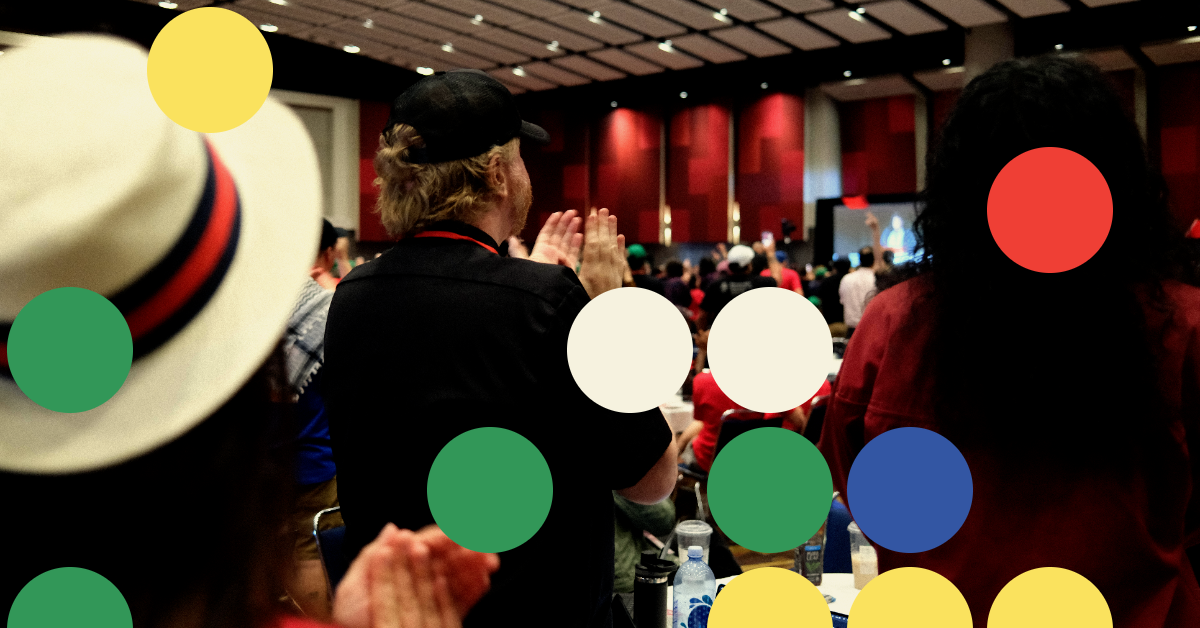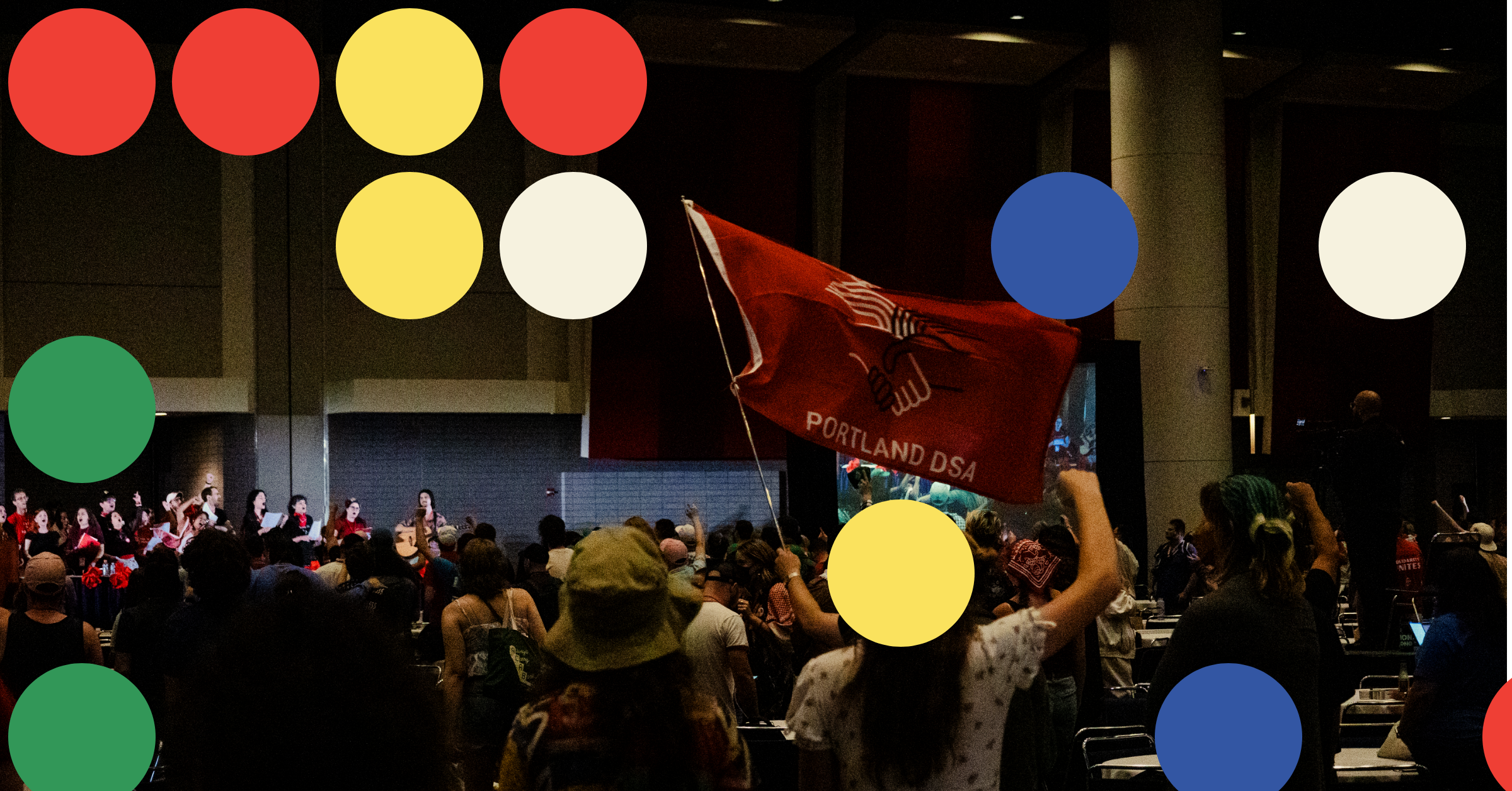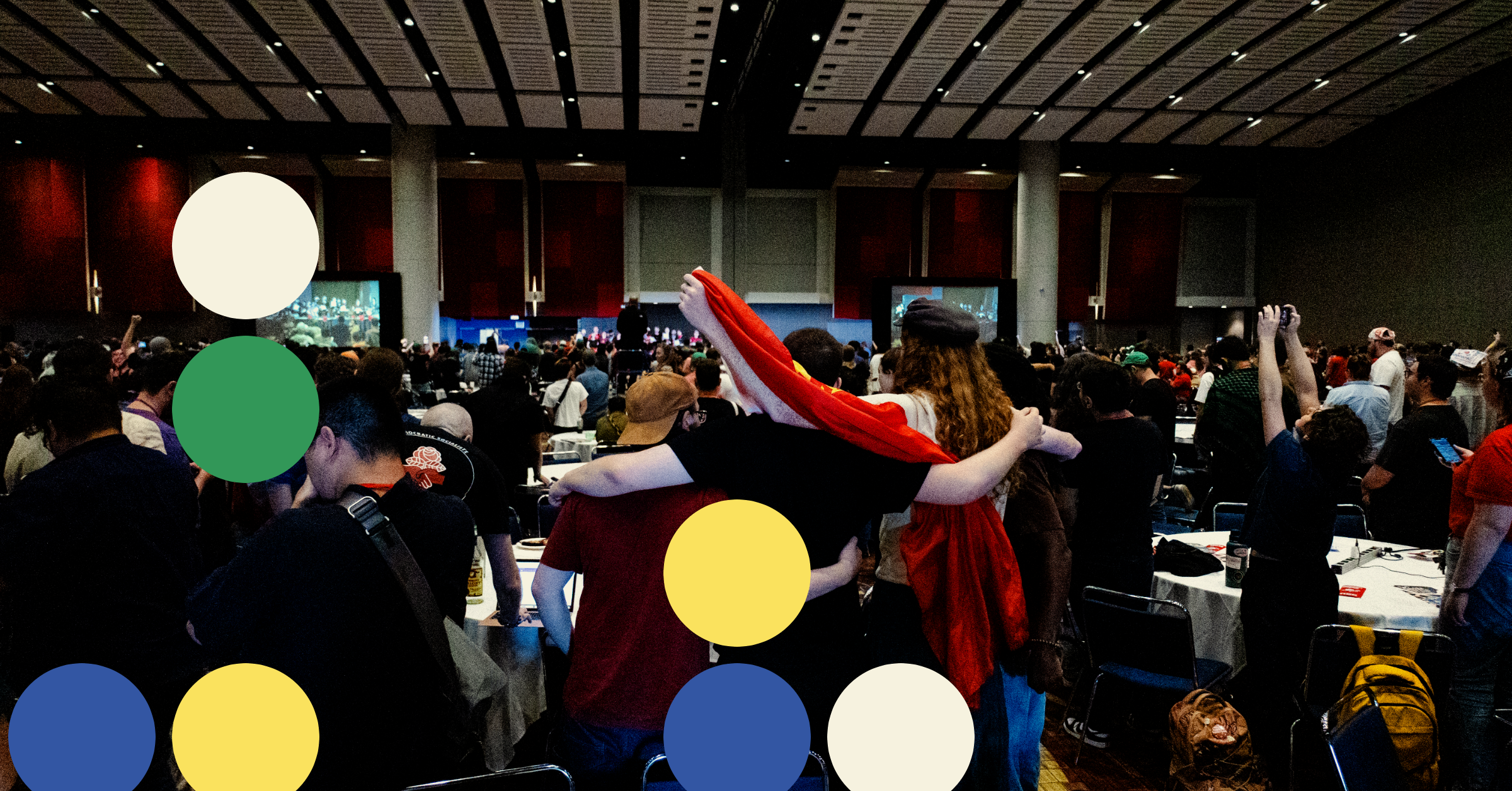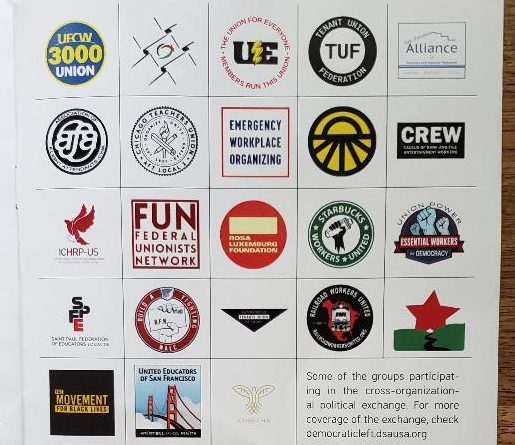Earlier this month, more than 1,200 socialists gathered in Chicago for the national convention of the Democratic Socialists of America (DSA). They were delegates, volunteers, and observers to the biggest convention in the organization’s history. At 80,000 members and growing, DSA is the beating heart of the U.S. Left. The socialist movement is still small, but the decisions we made this weekend — and how we choose to implement them — matter.
Our last convention was two years ago, early in August 2023. Since then, Israel’s genocidal war on Gaza has ramped up to a horrifying new level. The United Auto Workers (UAW) pulled off their inspiring Stand-Up Strike and UAW president Shawn Fain put out a call for unions to align contracts for a coordinated mass strike on May Day 2028. And of course, after a depressing and infuriating election, Trump has returned to power, gutting federal unions, terrorizing immigrant communities, repressing dissent, and building his own personal brand of authoritarian regime.
These are our new conditions — National Convention, our most important decision-making body, is where we map out how to respond. There were sharp debates, both on big-picture political questions and nitty-gritty internal issues. Delegates had to sift through over 100 pages of political resolutions and decide between 40 different candidates for national leadership. At the end of the weekend, we all left Chicago with some wins and some losses.
Now that we’re all back home, it’s time for DSA members to take stock. What are the real stakes of all those resolutions we debated? How are we going to bring them to life in our chapters, our unions, and our communities? How can we put workers into action to beat the Right, end the genocide, and fight the bosses in 2028?
The Fight for a Free Palestine
Israel’s genocidal war on Gaza has weighed heavily on these last two years. It’s not surprising that the fight to end the genocide and win Palestinian freedom was a major theme in Chicago.
One of the most hotly debated resolutions was “For a Fighting Anti-Zionist DSA”, which passed 56-44%. It condemns DSA’s Zionist past, makes public support for Israel and Zionism an expellable offense, and lays out some red lines on Palestine that our elected officials have to meet if they want to keep their DSA endorsements.
This resolution shared a shortcoming with other Palestine-focused debates we took up at this convention— it focused primarily on DSA’s political stances on paper. These stances are important but don’t give us a strategy to end the genocide. The resolution also included a laundry list of campaigns for DSA to take on with no analysis of which work to prioritize or where we have real leverage.
Another resolution we passed, however, did offer a focused strategic vision of how to end the genocide: “Labor for an Arms Embargo”, championed by Carnation and Bread & Roses.
The idea behind the Labor for an Arms Embargo (L4AE) campaign is simple: to build a mass base for pro-Palestine, anti-war politics in the labor movement. With bottom-up pressure from an organized rank-and-file, we can push our unions to take on “cross-union city-based campaigns” against the war machine, which steals money from our schools and hospitals and invests it into mass murder in Gaza. We can use our leverage as workers to pressure important political targets — from local port authorities to Congresspeople — to cut off the flow of American weapons to Israel.
An arms embargo won’t win Palestinian freedom overnight, but it’s the most important immediate step in ending the genocide, so it’s the most strategic demand for socialists to focus on right now. It’s made ground in key unions and Palestinian-led groups are already taking on this work, like Palestinian Youth Movement’s Mask Off Maersk campaign. DSA can advance this project even further with creative, coordinated organizing in key unions, port cities, and congressional districts.
After the failure of the Uncommitted campaign last year, the Left needs a unifying, strategic project to sustain our Palestine solidarity work. A strong arms embargo campaign rooted in the labor movement can be that project. It’s the best hope we have to stop the genocide and give Palestinians the breathing room to fight for their liberation.
The Road to 2028
The other major strategic questions we faced at this convention revolved around 2028 — the year of the next presidential election and the coordinated May Day strike called for by the UAW.
We made two big decisions around 2028:
- DSA will explore running a presidential candidate in 2028, thanks to a joint B&R-Groundwork resolution, “Unite Labor & the Left to Run a Socialist for President”, which passed 55-45%.
- DSA will coordinate with unions and rank-and-file caucuses, locally and nationally, to build May Day 2028 into a powerful mass labor action, according to the plan we passed in “Fighting Back in the Class War.”
It’s been a long time since labor and the Left ran candidates together at any level in U.S. politics — the last presidential race where that happened was more than 100 years ago. And although this country has seen plenty of general strikes, they have almost always been spontaneous and unplanned. We’ve never had the kind of big, conscious, politicized confrontations with capital that workers around the world use to defend their rights.
With these two resolutions, DSA is committed to changing that.
There wasn’t much real disagreement on the May Day plan, at least not on paper, so it was put on the “consent agenda” (more on that below). But as the final vote reflected, many delegates had doubts about DSA intervening in the presidential race.
The arguments against the resolution ranged from concerns about DSA’s lack of capacity and resources to back a campaign this big, to doubts that we can replicate the “Bernie Bump” (which sparked DSA’s membership explosion from 2016-2020). Opponents also favored an amendment that would explore running an independent or third-party campaign instead of using the Democratic ballot line, citing the Democrats’ toxic national brand and DSA’s commitment to independent working-class politics.
These doubts are understandable. A presidential campaign is a huge undertaking. The Democrats are deeply, deeply unpopular and beaten-down workers are open to working-class politics. We should definitely experiment with independent campaigns (the National Electoral Commission Consensus Resolution, which we also passed, commits us to recruiting at least three socialists to run as independent or non-partisan candidates in 2026-2028). The contradictions of running on the Democratic line are intense, especially in national races.
But most delegates were convinced that the risks are worth it. The presidential race is the center of gravity in U.S politics; outside of periods of mass protest, no other event politicizes millions of working people in the same way. Even if we run independently on the local and state levels, or contest Congressional races, Bernie showed that the path to a mass audience in the presidential race runs through the Democratic primary. With a viable candidate and a strong working-class platform, we can reach millions of workers with the message that a better world is possible, like Zohran Mamdani’s campaign is doing in New York City.
Our May Day plans are ambitious. They raise tough questions that DSA has faced since its rebirth: Can we do more than react to events as they unfold? Can we make political interventions that have a real impact on national politics? This convention elected a much bigger, multi-tendency National Political Committee — can they find enough political common ground to carry out two ambitious mass organizing projects over the span of two years?
We’ll find out together if DSA is up to the task. Building a viable presidential campaign and a powerful May Day coalition will be the most important test yet of our socialist big tent.
Missing Pieces
Lots of important and exciting items were thrown into the convention’s “consent agenda”: a package of resolutions that had enough support to be passed with no debate. Through this process, DSA committed to organizing Amazon, supporting federal workers, making DSA a multilingual organization, and much more. Even major strategic commitments like the May Day plan were included in the consent agenda.
We also had to kick the can down the road on some issues. A resolution on how to fight Trump and the MAGA movement, written by Socialist Majority, is still on the table, with important amendments authored by other caucuses. So is the YDSA consensus resolution, which defines the relationship with our youth wing. And same for other resolutions on resisting Trump’s anti-immigrant crackdown, DSA’s relationship to Representative Alexandria Ocasio-Cortez, and more. We ran out of time to discuss all these items, which have been sent to a vote on the new National Political Committee.
In other words, there were too many resolutions and not enough time. We missed out on a chance to talk about essential parts of our strategy, especially fighting the Right and resisting mass deportations. That was a serious drawback of this convention’s structure.
Debate was also less political and less engaging than the last convention. Not all votes were predetermined — a solid chunk of the delegate body was persuadable and not attached to any faction — but there was a definite trend toward factionalism. Caucuses clumped together at tables; many speeches were repetitive and mechanical, not engaging with points brought up by the other side; and too many people (myself included) were paying more attention to the groupchats blowing up their phones than the debate unfolding on the floor.
These are less political problems and more problems with the culture of the organization. They are not inevitable, and they are not signs we’re hurtling toward a split. But we will need to put some thought into how we avoid them at future conventions.
Growing Out of Growing Pains?
At our last convention, DSA was hurting. Our membership was tanking from the one-two punch of the Covid pandemic and the post-Bernie slump. We were on the verge of a serious budget crisis. The shadow of the 2024 election loomed over our debates. National politics felt even more grim and hopeless than usual, with DSA powerless to stop the country from hurtling into war, recession and authoritarianism.
This convention felt different. We’re back under a Trump administration. The regime is more brutal and more effective than last time, but familiar territory for an organization that was reborn during the first Trump years. Most importantly, we’ve grown — and not just in membership numbers.
Every major tendency in the organization worked together to pass a package of important structural reforms through the Democracy Commission; they passed by a supermajority of more than 80%, a first in DSA history. We made Workers Deserve More our official political program, a huge step forward from the messy and long-winded “platform” we patched together in 2021. And we hosted more than 40 different unions, working-class organizations, and international parties for an exciting political exchange about party-building, worker power, and 2028. Even just a few years ago, none of this would have been possible. DSA is starting to act like a serious political party.
We’re also growing in the strength, size, and maturity of our activist layer, one of the most precious resources of any political organization. Each year the convention body is made up of more and more experienced organizers. Delegates aren’t just leaders in their chapters, they’re leaders in their workplaces and unions, in tenant and community organizations, in city councils and state houses. What other organization could boast that many elected officials at their convention — not just as props or guest speakers (although Rashida’s speech brought the house down) but as cadre members who whip votes and argue at the mic, who care deeply about the political direction of the movement?
We are not where we need to be. We’re not yet deeply rooted in important parts of the working class of this country. We’re still building the skills, the organizers, and the mass membership that can make us a political force to reckon with. But the gains we’ve made over almost a decade of the “new DSA” should not be taken for granted.
DSA is on the road to 2028. Time to focus, organize like hell, and see where it takes us.




